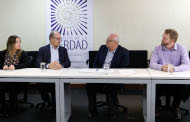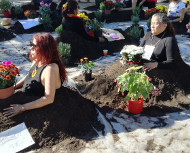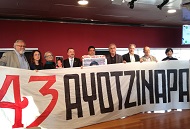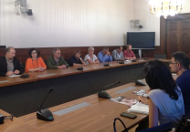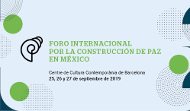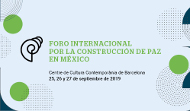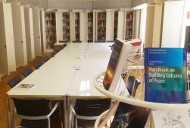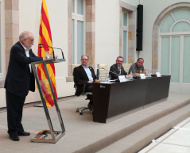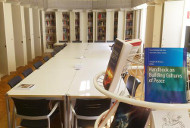On Wednesday 9 October, the plenary of the Parliament appointed four new members to the ICIP Board of Governors from the eight candidates presented by the Catalan Council for the Promotion of Peace.
As a result, Gemma Casal, anthropologist and lecturer at the University of Lleida, and Marco Aparicio, professor of Constitutional Law at the University of Girona, have joined ICIP’s governing body for the first time. In addition, journalist Carme Colomina renewed her mandate and lawyer Magda Oranich will continue as a Board member, in this case replacing Vicent Martínez Guzmán, who passed away in August 2018. The election of the four new members was approved, by electronic and secret ballot, with 91 votes in favor, 35 against and four abstentions.
With this renewal of the ICIP Governing Board, Antoni Pigrau, professor of Public International Law at Rovira i Virgili University in Tarragona, ends his term.
The Governing Board, in accordance with the provisions of Article 6 of Law 4/2007, consists of ten members: seven elected by the Parliament of Catalonia and three appointed by the Catalan Government.
Composition of the Governing Board
Author: whads
ICIP and the Truth Commission of Colombia sign a collaboration agreement to facilitate working with victims of the conflict in Europe
Barcelona, 8 May 2019.- On Tuesday, in Bogotá, the International Catalan Institute for Peace (ICIP) and the Commission for the Clarification of Truth, Coexistence and Non-Repetition of Colombia signed the collaboration agreement that grants ICIP the role of Technical Secretariat of the Truth Commission in Europe. The objective of this collaboration is to facilitate the work of the Truth Commission with victims living in Europe, in the framework of the implementation of the 2016 Peace Agreement.
Based on this agreement, ICIP will offer technical and logistical support to the activities organized by the Truth Commission in Europe, coordinate working groups established in various European countries (nodes), and provide methodological support to the process of taking testimony from the victims of the Colombian conflict in exile, in order to document cases and contribute to the clarification of the truth, justice and non-repetition of the crimes.
To carry out this process, ICIP organized the first training session of a group of people in charge of conducting interviews with victims in exile, which took place in February in Barcelona. The session brought together forty participants from ten countries, with experience working with victims of the Colombian conflict.
Although ICIP and the Truth Commission have been collaborating together for months, the signing of the agreement took place on Tuesday, in Bogotá, and was attended by ICIP president Xavier Masllorens, ICIP director Kristian Herbolzheimer, and the general secretary of the Truth Commission of Colombia, Mauricio Katz. “There are countries where the victims are very organized; in others, not so much. But we are working well on issues of psychosocial healing, female empowerment and dignification of victims, among others. And now we will continue to do so with the support of the Commission. The victims in exile want to be heard because they really believe that this is an important step towards reconciliation in the country,” said Xavier Masllorens, president of ICIP.
Innovative and unprecedented mandate
The Truth Commission of Colombia has an innovative mandate that is unprecedented in other truth commissions. This mandate involves approaching the tens of thousands of people who had to leave the country during the five decades of armed conflict, searching for new life options, mainly in the Americas and in Europe. The objective for 2019 is to document the cases of a thousand victims in Europe.
The mandate of the Commission envisages a participatory process with the victims themselves, in order to promote their psychosocial healing and coexistence among victims of different armed actors. To accomplish this task, the support of social and institutional organizations in the European countries where these people reside is essential.
To carry out the mandate of the Truth Commission in Europe, work groups (nodes) have been set up in Catalonia, France, Belgium, Germany, Switzerland, Sweden, Ireland and the United Kingdom. The creation of additional nodes is planned. addicionals.
ICIP participates in two international congresses on memory and reconciliation in Finland and Madrid
During the months of May and June, ICIP will participate in two international congresses to share the work carried out in the project “Strategies of memory, truth and reconciliation of Colombian women abroad.” Implemented in Barcelona in 2017, the initiative arose with the aim of contributing to peacebuilding in Colombia with innovative methodologies through art.
To publicize this experience, ICIP will conduct a creative workshop on Teaching Transmission of Trauma and Experimental Learning, organized by the University of Turku (Finland), from 27-29 May. The workshop will be led by Maria Fanlo, coordinator of ICIP’s “Peacebuilding and development of coexistence after violence” program, and Íngrid Guyon, a photographer and filmmaker. In addition, ICIP will also be present at the Third Annual Memory Studies Association Conference which will take place this year in Madrid from 25-28 June.
The project on strategies of memory and reconciliation of women in the Colombian diaspora is part of the program “Peacebuilding and development of coexistence after violence” carried out by ICIP with the aim of deepening the analysis of contexts characterized by periods of continued violence, as well as the experiences, tools and opportunities for peacebuilding in societies that have experienced conflict.
Cuerpos Gramaticales travels to Northern Ireland
The Northern Ireland city of Belfast hosted from March 6th till 9th several events around Cuerpos Gramaticales, a project designed in Colombia by Agroarte collective and developed in Barcelona by ICIP in 2017 with the aim of generating memory practices that contribute to peacebuilding, symbolic reparation and recognition of civil society processes.
Maria Fanlo, coordinator of the ICIP program “Peacebuilding and promotion of coexistence after violence”, and Ingrid Guyon, photographer and filmmaker, have been invited by Beyond Skin to share their experience and project documentation with the aim of contributing to its adaptation to the Northern Irish context. The visit also served to learn about the #FUTyoURES initiative, a peace program between Northern Ireland, Colombia and the Colombian diaspora developed by Beyond Skin and Escuelas de Paz.
On the occasion of International Women’s Day, the delegation has participated in the commemorative event on March 8th with artists and peace builders from the Colombian community in Ireland and Northern Ireland. The program has been organised by Beyond Skin in partnership with ICIP, Agroarte, Cuerpos Gramaticales, Esculeas de Paz and Fotosynthesis.
Call for nominations for the ICIP Peace in Progress Award 2019
The ICIP has announced the call for nominations for the ninth edition of the ICIP Peace in Progress Award. This prize aims to publicly recognize individuals, entities or institutions that, in an outstanding and extensive manner, have worked and contributed to the promotion and building of peace.
The deadline for submitting nominations is Thursday June 13. Nominations must be delivered it to the ICIP office at Carrer Tapineria 10, 3a planta, 08002 Barcelona, Spain.
The ICIP Peace in Progress Award consists of public recognition, a sculpture created by the Nobel Peace Prize winner, artist and activist, Adolfo Pérez Esquivel, called Porta del sol, and 6,000 euros.
In previous editions, the award was granted to the Mexican organization Cauce Ciudadano (2018), the activist Arcadi Oliveres (2017), Peace Brigades International (2016), the Capuchin friar Joan Botam (2015), WILPF (2014), the ex-general Jovan Divjak (2013), Madres de Soacha (2012), and the struggle of conscientious objectors and “insubmisos” (people who refuse to do military service or any substitute social work) represented by Pepe Beúnza. The same year, the Parliament of Catalonia was honored with an extraordinary edition of the award.
Retrieve the videos of the International Forum on Peacebuilding in Mexico
On 25, 26 and 27 September, ICIP organized the First International Forum on Peacebuilding in Mexico together with Taula per Mèxic and the Mexican organization Serapaz. The event brought together forty speakers and more than a hundred attendees from the academic and cultural worlds, social activism, institutions and journalism. Three days of discussions about the opportunities and glimmers of hope that have recently emerged in Mexico to advance in peacebuilding, in a country with extremely high rates of violence: homicides, extortions, kidnappings, enforced disappearances and numerous human rights violations.
A number of experts participated in the Forum in order to address the current challenges that Mexico faces in various areas: from security, migration analysis, struggles for the defense of land and territory, the situation regarding freedom of the press and the need to make progress in the areas of truth, justice and reparation for victims.
The celebration of the Forum coincided with the fifth anniversary of the disappearance of 43 students in Ayotzinapa, in Iguala, an emblematic case of impunity, corruption and the lack of truth and justice that exists in the country. The father of one of the young students, Epifanio Álvarez, participated in the conference, bringing Barcelona his struggle and that of the thousands of families with relatives who have disappeared. Also participating was Yolanda Álvarez, mother of a person who disappeared in 2008 at the hands of the military and present director of Colectivo Búscame, an organization for relatives of disappeared persons.
The opening session of the Forum, on Wednesday, 25 September, was attended by the Minister of Foreign Affairs, Alfred Bosch, the general director of Cooperation, Manel Vila, the Deputy Mayor of Barcelona, Laura Pérez Castaño, along with representatives of ICIP, Taula per Mèxic and Serapaz.
Videos of the Forum sessions are available on the ICIP YouTube channel.
Speakers participating in the Forum include representatives of the Collective for the Analysis of Security with Democracy (CASEDE), CIDOB, the Oaxaca Consortium for Parliamentary Dialogue, El Colegio de la Frontera Norte, Service for Peace and Justice (SERPAJ), the Center for Research and Advanced Studies in Social Anthropology (CIESAS), the Mexican Commission for the Defense and Promotion of Human Rights, the Institute for Integrated Transitions, the Kellogg Institute for International Studies at the University of Notre Dame and the Human Rights Institute of Catalonia.
The Government of Catalonia, the Barcelona City Council and Casa Amèrica Catalunya collaborated in the organization of the Forum.
The event is part of the ICIP work program “Violence outside the context of war.”
Coinciding with the celebration of the Forum, ICIP has published the monograph “Mexico: tracing opportunities for peace” in the Peace in Progress journal. It is available in English, Catalan and Spanish.
Victims of ETA and of state violence stand together to defend ideological diversity and the recognition of all victims at a meeting in Parliament
The International Catalan Institute for Peace (ICIP) and the Permanent Social Forum of the Basque Country promoted the meeting that took place this afternoon in the Parliament of Catalonia between a delegation of Catalan and Basque victims and representatives of various parliamentary groups. The objective of this meeting was to draw attention to the plurality of victims of all forms of terrorism, and the need for both stronger institutional support and an equal recognition of all victims.
On the part of the delegation of victims, participants included Rosa Lluch, daughter of Ernest Lluch, a politician assassinated by ETA; Rosa Maria Cabré, daughter of one of the people killed by ETA in the Hipercor car bomb attack; Roberto Manrique, injured in the same Hipercor bombing; Axun Lasa, victim of torture and sister of Joxean Lasa, murdered by GAL; and Andoni Txasko, victim of the events that took place in Vitoria on 3 March 1976 as part of a union strike, during which five of his colleagues died and he lost an eye after a police beating.
Participating on the part of the parliamentary groups, were Josep Maria Forné (Junts per Catalunya), José Rordíguez (ERC), Esther Niubó (PSC), Marc Parés (Catalunya en Comú-Podem) and Carles Riera (CUP). ICIP president Xavier Masllorens, ICIP director Kristian Herbolzheimer and Social Forum coordinator Agus Hernán were also present at the meeting.
The victims informed the political representatives of the need to publicly recognize all the victims of the Basque conflict: not only those of ETA, but also the victims of GAL and the police forces. They also wanted to underscore their “ideological diversity,” and criticized the use of the pain of the victims as a bone of contention between political parties. “We are sick and tired of people who speak on behalf of the victims without asking us for our opinion,” said Roberto Manrique.
Andoni Txasko lamented that the State obstructs the recognition of the truth and the rights of all victims and stated that “victims of state violence will continue to fight to achieve the same recognition and consideration as the other victims.”
For her part, Rosa Lluch defended the need for all victims to be heard and stated that “as victims of ETA we have the obligation to facilitate the discourse of the other victims” so that everyone can enjoy the same recognition on the part of the State. “It is very important for me to be sitting here today next to a victim of GAL,” she added, a sentiment shared by the other delegation members.
In her speech, Axun Lasa defended the need to name the victims of the State and to refer to the victims of torture as such, and not as victims of police abuse.
All the victims highlighted the “liberating” and “reassuring” effect resulting from meeting victims of other types of violence.
Institutional statement
The meeting allowed for the delegation of victims to transmit to the parliamentary groups their desire for the Parliament of Catalonia to adopt an institutional statement recognizing all victims, along the lines of the Declaration for Peace in the Basque Country, approved just one year ago by the Barcelona City Council. At the same time, a request was made for Parliament to promote the creation of an office to assist the victims of the various forms of terrorism experienced in Catalonia.
For their part, the parliamentary group representatives expressed empathy for the pain of the victims and highlighted the moral value of their joint testimony at a time of strong political polarization. They also expressed their commitment to working to achieve the necessary consensus in the Catalan chamber in order to approve an institutional declaration of recognition of all victims.
On Tuesday 2 July, at 6:30 pm, the delegation of victims will participate in the public event entitled “Listen to us to coexist: Dialogues between victims of ETA and of the State” at the Association of Journalists of Catalonia.
International Forum on Peacebuilding in Mexico
Mexico has been experiencing a serious crisis of security for many years, which seriously affects the human rights of people who live or travel there. The most worrying facts include the high rate of murders (33,000 in 2018) and forced disappearances (40,000 in the last 13 years), as well as the routine practice of torture and sexual violence, human trafficking and attacks against freedom of expression and social activism. In addition, there are all the types of violence associated with impoverishment, social exclusion and the plundering of land. The causes of this crisis are multidimensional and combine a number of factors related to the dynamics of organized crime, corruption and how the public institutions work, including the security forces and the judicial system.
In a situation in which the levels of insecurity and suffering are comparable to those of an armed conflict, it is necessary not only to denounce internationally what is happening in the country, but also to develop strategies of peace and the restoration of human rights. Numerous initiatives have been emerging from social society in this regard despite all the difficulties and dangers. There are also numerous voices calling for new security policies that are demilitarized and that focus on people’s real needs. For its part, the new Mexican government has also made proposals to reduce the levels of impunity and promote social welfare during its first months in power.
With the aim of disseminating, analyzing and debating these glimmers of hope that could lead to peace in Mexico, ICIP, together with Taula per Mèxic and the Mexican organization SERAPAZ, has organized the first International Forum on Peacebuilding in Mexico. The Forum will take place at the Center for Contemporary Culture of Barcelona (CCCB) on 25, 26 and 27 September 2019.
Speakers include representatives of the Collective of Analysis of Security with Democracy (CASEDE), CIDOB, the Oaxaca Consortium for Parliamentary Dialogue, El Colegio de la Frontera Norte, Servicio Paz y Justicia (SERPAJ), the Center for Research and Higher Studies in Social Anthropology (CIESAS), the Mexican Commission for the Defense and Promotion of Human Rights, the Institute for Integrated Transitions and the Kellog Institute for International Studies of the University of Notre Dame. The Forum will also feature the participation of human rights defenders, threatened journalists and relatives of victims of forced disappearance.
The Forum will coincide with the fifth anniversary of the forced disappearance of 43 students from Ayotzinapa, in Iguala; a memorial ceremony with relatives of the disappeared will be held in parallel with the discussion panels.
The event is part of the ICIP work program “Violence in non-war settings” and is open to the public with prior confirmation of attendance at activitats.icip@gencat.cat.
International Forum on Peacebuilding in Mexico
Mexico has been experiencing a serious crisis of security for many years, which seriously affects the human rights of people who live or travel there. The most worrying facts include the high rate of murders (33,000 in 2018) and forced disappearances (40,000 in the last 13 years), as well as the routine practice of torture and sexual violence, human trafficking and attacks against freedom of expression and social activism. In addition, there are all the types of violence associated with impoverishment, social exclusion and the plundering of land. The causes of this crisis are multidimensional and combine a number of factors related to the dynamics of organized crime, corruption and how the public institutions work, including the security forces and the judicial system.
In a situation in which the levels of insecurity and suffering are comparable to those of an armed conflict, it is necessary not only to denounce internationally what is happening in the country, but also to develop strategies of peace and the restoration of human rights. Numerous initiatives have been emerging from social society in this regard despite all the difficulties and dangers. There are also numerous voices calling for new security policies that are demilitarized and that focus on people’s real needs. For its part, the new Mexican government has also made proposals to reduce the levels of impunity and promote social welfare during its first months in power.
With the aim of disseminating, analyzing and debating these glimmers of hope that could lead to peace in Mexico, ICIP, together with Taula per Mèxic and the Mexican organization SERAPAZ, has organized the first International Forum on Peacebuilding in Mexico. The Forum will take place at the Center for Contemporary Culture of Barcelona (CCCB) on 25, 26 and 27 September 2019.
Speakers include representatives of the Collective of Analysis of Security with Democracy (CASEDE), CIDOB, the Oaxaca Consortium for Parliamentary Dialogue, El Colegio de la Frontera Norte, Servicio Paz y Justicia (SERPAJ), the Center for Research and Higher Studies in Social Anthropology (CIESAS), the Mexican Commission for the Defense and Promotion of Human Rights, the Institute for Integrated Transitions and the Kellog Institute for International Studies of the University of Notre Dame. The Forum will also feature the participation of human rights defenders, threatened journalists and relatives of victims of forced disappearance.
The Forum will coincide with the fifth anniversary of the forced disappearance of 43 students from Ayotzinapa, in Iguala; a memorial ceremony with relatives of the disappeared will be held in parallel with the discussion panels.
The event is part of the ICIP work program “Violence in non-war settings” and is open to the public with prior confirmation of attendance at activitats.icip@gencat.cat.
New items at the ICIP Library
The ICIP Library acquired a hundred new publications in January, most of which are available on loan. The Library, specializing in issues of peace culture, security and conflicts, and a benchmark in this field in Catalonia, is located on Carrer Tapineria 10, 1st floor, in Barcelona.
The Library supports ICIP and researchers and experts in the field of peace, and is in permanent contact with similar centers and institutions from around the world. It is part of the network of specialized libraries of the Generalitat and is included in the University Union Catalogue of Catalonia (CCUC).
Consult the library catalogue.
Arcadi Oliveres receives the ICIP Peace in Progress Award in a moving ceremony in Parliament
The International Catalan Institute for Peace (ICIP) presented the 2017 Peace in Progress Award to the activist Arcadi Oliveres in a ceremony that took place in the auditorium of the Parliament of Catalonia on Tuesday 17 April. The event was marked by the remembrance of the imprisoned and exiled politicians and the curtailment of rights and freedoms we are experiencing in Catalonia. Arcadi Oliveres has been honored for his commitment and tireless dedication to the promotion of peace, social justice, human rights and disarmament, from a universal perspective.
The ceremony, attended by three hundred people, was presided over by the vice president of the Parliament, Josep Costa, and ICIP president Xavier Masllorens, who expressed “consternation at the deterioration of democracy and concern about each person who accepts a curtailment of rights and freedoms in the name of security.” Masllorens acknowledged Arcadi Oliveres’ lifetime achievements and stressed his “courageous, compelling and forceful response to the injustice of an economic and power system that needs containment and regulation.”
During the ceremony a video highlighting the award recipient’s career was screened and afterwards Arcadi Oliveres accepted the award amid a standing ovation from the audience. In his acceptance speech, Oliveres recalled the ex-president of Parliament, Carme Forcadell, and the conseller (minister) Raül Romeva, absent from the event due to their imprisonment, and described as unacceptable the “unjustified repression of the process of a people that want to achieve their political fulfillment.” And he has called for the fight to continue: “We must recognize that despite our desires of peace, these are not peaceful times (…). We cannot, however, become discouraged; we must move forward and continue committed to what we all aim for, the progress of human dignity.”
Journalist David Fernàndez, who paid tribute to Arcadi Oliveres in a very moving speech, concurred that we must not be disheartened: “We demand peacebuilding precisely in its absence, which is when it is most necessary to do so.” Fernàndez, who is also an activist and a former student of Arcadi Oliveres’, described him as “tireless, indefatigable and inexhaustible; disobedient, peaceful and nonviolent” and added: “Arcadi has never accepted everything they said could not be changed; instead, he has gone about changing everything that could not be accepted.” Fernàndez also highlighted the humanist ethics espoused by Arcadi, who reminds us that another world is possible: “Arcadi is value without price and peace without war or injustice (…), both generosity and goodness.”
At the closing of the ceremony, the vice president of Parliament, Josep Costa, congratulated Arcadi Oliveres and stressed that “Catalonia’s commitment to peace is an intrinsic part of our history, a fundamental value of our society.” Costa also referred to the current political situation in Catalonia: “It is unacceptable to claim that legitimate social mobilizations are violent. Catalonia has always opted for the path of democracy and dialogue,” he said.
New items at the ICIP Library
The ICIP Library acquired a hundred new publications in February, most of which are available on loan. The Library, specializing in issues of peace culture, security and conflicts, and a benchmark in this field in Catalonia, is located on Carrer Tapineria 10, 1st floor, in Barcelona.
The Library supports ICIP and researchers and experts in the field of peace, and is in permanent contact with similar centers and institutions from around the world. It is part of the network of specialized libraries of the Generalitat and is included in the University Union Catalogue of Catalonia (CCUC).
Consult the library catalogue.


